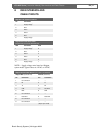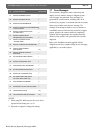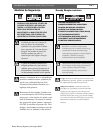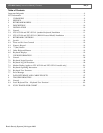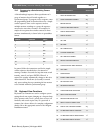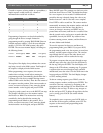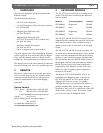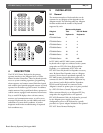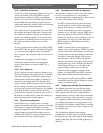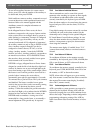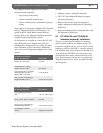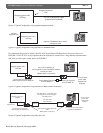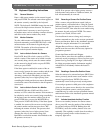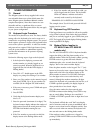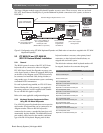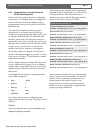
LTC 8555 Series | Instruction Manual | User Information
EN
|
23
Bosch Security Systems | 29 August 2003
7.5.12 Load/Clear a Sequence
To load a previously programmed sequence so it can be
run on your monitor, press SEQUENCE, enter the
desired sequence number (1 to 60 for most Allegiant
models, or 1 to 256 for the LTC 8900 system), and then
press ENTER. Note that loading a sequence does not
automatically initiate the sequence. Refer to the following
sections for sequence control information.
Since sequences may be programmed to use more than
one monitor, all monitors required for a sequence must
be available. If a sequence is already on a monitor, the
operator who loaded it originally (or an operator with a
higher priority) is permitted to load a new sequence on
the monitor or monitors. Others receive an error
message.
To clear a sequence from a monitor, press SEQUENCE
and ENTER. Only the operator who loaded it originally
(or an operator with a higher priority) is permitted to
clear a sequence from a monitor. Others receive an error
message.
If enabled, the status display area of the monitor
indicates the sequence number in the appropriate
location. If no sequence is currently loaded, "00" is
displayed.
7.5.13 Run a Sequence
To run a sequence currently loaded on a monitor, press
RUN. If the sequence was stopped, the RUN command
will initiate sequencing. The direction of sequencing is
indicated in the monitor status display (if enabled) by a
directional arrow and the letter 'R' to the right of the
sequence number. If RUN is pressed while a sequence is
already running, the switcher goes immediately to the
next step in the sequence, and continues to run. Holding
down RUN produces a 'quick-scan' effect. If RUN is
pressed when no sequence is loaded, an error results. If
the monitor is in alarm, RUN controls the switching of
alarm video rather than a loaded sequence.
7.5.14 Stop a Running Sequence
Press HOLD to stop a sequence if one is currently
running. The monitor status display shows 'S' to the right
of the sequence number. If the sequence is already
stopped, pressing HOLD has no effect. If no sequence is
currently loaded, pressing HOLD results in an error
condition. If the monitor is in alarm, HOLD stops the
alarm switcher rather than a loaded sequence.
7.5.15 Controlling the Direction of a Sequence
The direction of a sequence can be set to run in either a
forward or reverse direction. It is also possible to
manually step though a stopped sequence, either forward
or reverse. These actions work as follows:
If NEXT is pressed with the sequence in the stop
state, the sequence switches forward and remains
stopped. If the sequence is running when NEXT is
pressed, it immediately goes to the next step and
continues to run. The same is true for PREV, but in
the reverse direction. If either NEXT or PREV is
held down, a 'quick-scan' effect, switching at a rate of
approximately two steps per second, takes place.
When sequences are first loaded, the direction
defaults to forward.
If PREV is pressed while a camera sequence is
running, it reverses the sequence. If PREV is pressed
while in a hold mode and the display is showing the
forward prompt, the first push changes the direction
only, and a second push switches to the previous
step. The same is true for NEXT in the opposite
direction. The monitor status display shows an arrow
pointing either up or down, indicating the direction
of the sequence. The arrow is to the right of the
sequence number, either above or below the
sequence run ‘R’ or stopped ‘S’ indicator. If the
monitor is in alarm, PREV and NEXT control the
alarm switcher rather than the loaded sequence.
If no sequence is loaded, pressing NEXT or PREV
automatically steps the switcher through the camera
numbers in numerical order.
7.5.16 Programming a Simple Camera Sequence
The Allegiant system has very powerful sequencing
capabilities. Using a system keyboard, it is possible to
enter sequences that will run on a single monitor or
multiple monitors. As long as valid camera and monitor
numbers are used, they can be entered into a sequence
in a completely random order. More powerful features
are available when sequences are programmed via the
PC-based LTC 8059 Master Control Software, including
the capability to activate receiver/driver actions as part
of a sequence step.
The only limitation associated with sequence
programming is the CPU memory required for storing
the sequence steps. The current limit for most Allegiant
models is 3000 steps, but the LTC 8900 supports up to
6000 steps.



